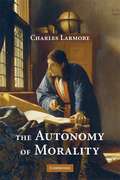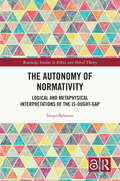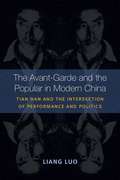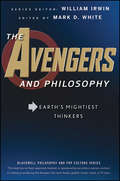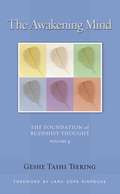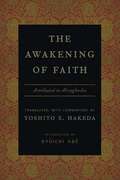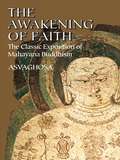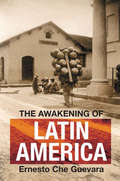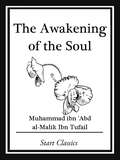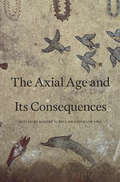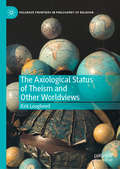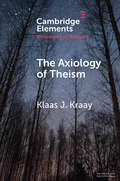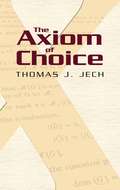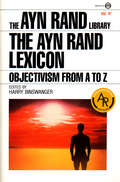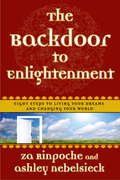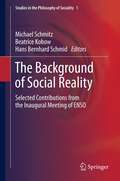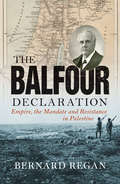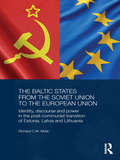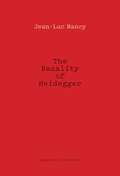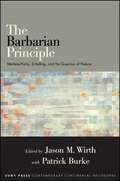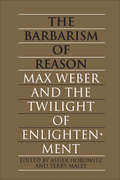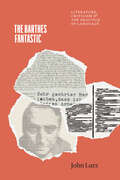- Table View
- List View
The Autonomy of Morality
by Charles LarmoreIn The Autonomy of Morality Charles Larmore challenges two ideas that have shaped the modern mind. The world, he argues, is not a realm of value-neutral fact, nor does human freedom consist in imposing principles of our own devising on an alien reality. Rather, reason consists in being responsive to reasons for thought and action that arise from the world itself. Larmore shows that the moral good has an authority that speaks for itself. Only in this light does the true basis of a liberal political order come into view, as well as the role of unexpected goods in the makeup of a life lived well.
The Autonomy of Normativity: Logical and Metaphysical Interpretations of the Is-Ought-Gap (Routledge Studies in Ethics and Moral Theory)
by Singa BehrensWhile the Is-Ought Gap has recently been a topic of growing interest, most contributions are firmly fixed on logical, often quite technical accounts of the autonomy thesis. This book defends two complementary autonomy theses—a modal and ground-based thesis—that provide a deeper and more comprehensive understanding of the nature of normativity.The autonomy thesis is often motivated by claims about the nature of the normative domain and its categorical difference from the non-normative domain. This book develops two novel interpretations of the autonomy thesis, one based on the notion of grounding and the other based on a notion of logical-semantic entailment, developed within a framework of truthmaker semantics. Together these accounts capture best the informal idea that we cannot ‘get’ something normative from the non-normative. The proposal is based on an analysis of what it means to say that certain propositional content parts are relevant to the instantiation of entailment and grounding relations. Moreover, the book relates the autonomy debate to other important metaethical debates, and it offers a more explicit account of the theoretical commitments of an autonomist position. Finally, it develops simple and elegant formal equivalents of the proposed autonomy theses which facilitate the evaluation of structurally complex proposed counterexamples, which have impeded a substantive autonomy debate.The Autonomy of Normativity will appeal to researchers and graduate students working in metaethics, metaphysics, and philosophical logic.The Open Access version of this book, available at www. taylorfrancis.com, has been made available under a Creative Commons Attribution-Non Commercial-No Derivatives (CC-BY-NC-ND) 4.0 International license. Funded by the Deutsche Forschungsgemeinschaft (German Research Council) through the Emmy-Noether Grant on Relevance (KR 4516/2-1), the European Research Council (ERC Grant 101040439, REASONS F1RST), and the Library of Bielefeld University.
The Avant-garde And The Popular In Modern China: Tian Han And The Intersection Of Performance And Politics
by Liang LuoThe Avant-Garde and the Popular in Modern China explores how an important group of Chinese performing artists invested in politics and the pursuit of the avant-garde came to terms with different ways of being "popular" in modern times. In particular, playwright and activist Tian Han (1898-1968) exemplified the instability of conventional delineations between the avant-garde, popular culture, and political propaganda. Liang Luo traces Tian's trajectory through key moments in the evolution of twentieth-century Chinese national culture, from the Christian socialist cosmopolitanism of post-WWI Tokyo to the urban modernism of Shanghai in 1920s and 30s, then into the Chinese hinterland during the late 1930s and 40s, and finally to the Communist Beijing of the 1950s, revealing the dynamic interplay of art and politics throughout this period. Understanding Tian in his time sheds light upon a new generation of contemporary Chinese avant-gardists (Ai Wei Wei being the best known), who, half a century later, are similarly engaging national politics and popular culture.
The Avengers and Philosophy
by William Irwin Mark D. WhiteAn engaging look at the philosophical underpinnings of Earth's Mightiest HeroesAvengers assemble! Tackling intriguing dilemmas and issues that no single great philosopher can withstand, this powerful book enlists the brainpower of an A-list team of history's most prominent thinkers to explore the themes behind the action of Marvel Comics' all-star superhero team.Arms you with new insights into the characters and themes of The AvengersDeepens your appreciation both of The Avengers comics and the Joss Whedon movie adaptationAnswers the philosophical questions you've always had about Earth's Mightiest Heroes, including: Can a reformed criminal become a superhero? Can an android love a human? If a hero beats his wife, is he still a hero?Helps you think differently about the members of the superhero team--Captain America, Iron Man, Thor, and the othersThis thought-provoking book will help you understand this band of superheroes better, whether you've followed the Avengers for years or are a Joss Whedon fan just getting to know them.
The Awakening Mind
by Lama Thubten Zopa Rinpoche Geshe Tashi Tsering Gordon McdougallBodhichitta, often translated as "great compassion," is the gem at the heart of Buddhism. From this altruistic desire to serve others, all other Buddhist practices naturally flow, therefore, this state of mind is one Buddhists should understand and cultivate. In The Awakening Mind, Geshe Tashi Tsering leads us through the two main methods to develop bodhichitta that have been developed by the great Indian and Tibetan Buddhists over the centuries: the seven points of cause and effect, and equalizing and exchanging the self with others. This is the fourth release from Geshe Tashi's Foundation of Buddhist Thought series, which individually and collectively represent an excellent introduction to Tibetan Buddhism. These unique and friendly books are based on the curriculum of a popular course of the same name, developed by Geshe Tashi himself. Geshe Tashi's presentations combine rigor and comprehensiveness with lucidity and accessibility, never divorced from the basic humanity and warmth of his personality. In Geshe Tashi, we encounter the new generation of Tibetan monk-scholars teaching in the West who are following in the footsteps of such revered and groundbreaking teachers as Geshe Wangyal and Geshe Sopa.
The Awakening of Faith: Attributed to Asvaghosha (Translations from the Asian Classics)
by Yoshito HakedaYoshito S. Hakeda's critical interpretation of the "Awakening of Faith" has become a classic. This edition, which includes a new introduction by Ryuichi Abe, presents a beautiful and accessible translation of one of the most influential works in Mahayana Buddhism. <p><p> "The Awakening of Faith" explores the path leading to enlightenment and teaches the principles and methods of meditation. However, the text does not advocate a passive retreat into the quietude of meditation; instead it calls for dynamic social engagement based on compassion and wisdom. Philosophical and religious in its approach, the "Awakening of Faith" provides a comprehensive summary of the essentials of Mahayana Buddhism. <p><p> "The Awakening of Faith", commonly attributed to Asvaghosha, has been read and studied for more than a thousand years. Hakeda's interpretive comments, which have influenced a generation of scholars and readers, illuminate and explain the work and its more esoteric elements. Ryuichi Abe's introduction examines the importance of Hakeda's translation as well as the place of the Awakening of Faith within Buddhism. In this reprint edition, Chinese terms are rendered in Pinyin romanization. Also new to this edition are a Chinese character glossary and a vastly expanded index, which identify and cross-reference both major and minor theoretical terms and concepts throughout the work.
The Awakening of Faith: The Classic Exposition of Mahayana Buddhism
by Teitaro Suzuki AsvaghosaComprehensive and coherent, this guide to a complex system of Buddhism is so authoritative that it has been employed in the instruction of Buddhist priests. Readers will find that it offers the keys to the essentials of Mahayana Buddhism, a liberal and theistic branch of the faith practiced chiefly in China and Japan.Translated by the distinguished scholar Teitaro Suzuki, the text discusses how humans can transcend their finite state to partake in the life of the infinite. Practices and techniques to assist believers in the awakening and growth of faith appear here, in addition to the most developed form of tathagata-garbha, or Buddha-matrix teachings.This accessible work was written specifically for those who prefer a brief and pithy presentation to extensive discourse.
The Awakening of Latin America
by Ernesto Che Guevara María del Ariet GarcíaThe name Che Guevara is synonymous with Latin America. This classic anthology on Latin America shows the Argentine-born revolutionary's cultural depth, rigorous intellect and intense emotional engagement with a continent and its people.Selected from his family's personal archives, this book offers the best of Che's writing: examples of his journalism, essays, speeches, letters and even his poetry, revealing the evolution of an extraordinary mind from that of an impressionable young medical student to the "heroic guerrilla," brutally assassinated in Bolivia. This anthology of Che Guevara's writing on Latin America is destined to become an instant classic comparable to Eduardo Galeano's Open Veins of Latin America."I consider my country to be not only Argentina but the entire Americas."-Ernesto Che Guevara
The Awakening of the Soul
by Muhammad ibn 'Abd al-Malik Ibn TurailIt is to two English scholars, father and son, Edward Pococke, senior and junior, that the world is indebted for the knowledge of one of the most charming productions Arabian philosophy can boast of. Generally looked upon as a subject of repulsive aridity, in its strange combination of the most heterogeneous philosophical systems, devoid of the grace and charm of attractive style, unbrightened by brilliancy of wit or spirit, Arabian philosophy has, for centuries past, been subject to sad and undeserved neglect. Yet I cannot imagine a better and more eloquent refutation of this erroneous view than a rendering, in fresh garb, of this romance of Hayy Ibn Yokdhan, simple and ingenuous, yet fragrant with poetry and withal fraught with deep philosophical problems the interest in which I wish to revive. It was in the year 1671 that there was published by the Oxford University Press, as one of its first issues of Arabic texts, a book called, "Philosophus autodidactus," edited by Edward Pococke the son, together with a Latin translation. It had a preface that bore the signature of Edward Pococke, the father, and this fact alone was sufficient to stamp it at once as a work in which vast erudition and thoroughness of investigation had joined hands--for both these savants were men of wide reputation and brilliant attainments.
The Axial Age and Its Consequences
by Robert N. Bellah Hans JoasThe first classics in human historyâthe early works of literature, philosophy, and theology to which we have returned throughout the agesâappeared in the middle centuries of the first millennium bce. The canonical texts of the Hebrew scriptures, the philosophical writings of Plato and Aristotle, the Analects of Confucius and the Daodejing, the Bhagavad Gita and the teachings of the Buddhaâall of these works came down to us from the compressed period of history that Karl Jaspers memorably named the Axial Age. In The Axial Age and Its Consequences, Robert Bellah and Hans Joas make the bold claim that intellectual sophistication itself was born worldwide during this critical time. Across Eurasia, a new self-reflective attitude toward human existence emerged, and with it an awakening to the concept of transcendence. From Axial Age thinkers we inherited a sense of the world as a place not just to experience but to investigate, envision, and alter through human thought and action. Bellah and Joas have assembled diverse scholars to guide us through this astonishing efflorescence of religious and philosophical creativity. As they explore the varieties of theorizing that arose during the period, they consider how these in turn led to utopian visions that brought with them the possibility of both societal reform and repression. The roots of our continuing discourse on religion, secularization, inequality, education, and the environment all lie in Axial Age developments. Understanding this transitional era, the authors contend, is not just an academic project but a humanistic endeavor.
The Axiological Status of Theism and Other Worldviews (Palgrave Frontiers in Philosophy of Religion)
by Kirk LougheedThis book explores the value impact that theist and other worldviews have on our world and its inhabitants. Providing an extended defense of anti-theism - the view that God’s existence would (or does) actually make the world worse in certain respects - Lougheed explores God’s impact on a broad range of concepts including privacy, understanding, dignity, and sacrifice. The second half of the book is dedicated to the expansion of the current debate beyond monotheism and naturalism, providing an analysis of the axiological status of other worldviews such as pantheism, ultimism, and Buddhism. A lucid exploration of contemporary and relevant questions about the value impact of God’s existence, this book is an invaluable resource for scholars interested in axiological questions in the philosophy of religion.
The Axiology of Theism (Elements in the Philosophy of Religion)
by Klaas J. KraayTheism is the view that God exists; naturalism is the view that there are no supernatural beings, processes, mechanisms, or forces. This Element explores whether things are better, worse, or neither on theism relative to naturalism. It introduces readers to the central philosophical issues that bear on this question, and it distinguishes a wide range of ways it can be answered. It critically examines four views, three of which hold (in various ways) that things are better on theism than on naturalism, and one of which holds just the opposite.
The Axiom of Choice
by Thomas J. JechComprehensive in its selection of topics and results, this self-contained text examines the relative strengths and consequences of the axiom of choice. Each chapter contains several problems, graded according to difficulty, and concludes with some historical remarks.An introduction to the use of the axiom of choice is followed by explorations of consistency, permutation models, and independence. Subsequent chapters examine embedding theorems, models with finite supports, weaker versions of the axiom, and nontransferable statements. The final sections consider mathematics without choice, cardinal numbers in set theory without choice, and properties that contradict the axiom of choice, including the axiom of determinacy and related topics
The Ayn Rand Lexicon
by Ayn Rand Harry BinswangerA prolific writer, bestselling novelist, and world-renowned philosopher, Ayn Rand defined a full system of thought--from epistemology to aesthetics. Her writing is so extensive and the range of issues she covers so enormous that those interested in finding her discussions of a given topic may have to search through many sources to locate the relevant passage. The Ayn Rand Lexicon brings together all the key ideas of her philosophy of Objectivism. Begun under Rand's supervision, this unique volume is an invaluable guide to her philosophy or reason, self-interest and laissez-faire capitalism--the philosophy so brilliantly dramatized in her novels The Fountainhead, We the Living, and Anthem.
The Ayurvedic Reset Diet: Radiant Health through Fasting, Mono-Diet, and Smart Food Combining
by Vatsala SperlingA step-by-step guide to Ayurvedic dietary resets to gently cleanse your digestive system and reboot your body and mind • Presents easy-to-follow instructions for a full 6- or 8-week Ayurvedic reset diet, as well as a simplified 1-week plan, detailing what to eat and drink day by day • Includes recipes, mindful eating tips, and meal prepping techniques • Explains the healing science of Ayurveda, the rejuvenating benefits of fasting and mono-diets, and how to maximize nutrient absorption with food combining Food sensitivities, chronic inflammation, obesity, and chronic disease are on the rise. Could our modern diets and mindless eating habits be to blame? How do you reboot your system--body, mind, and spirit--and start the path to radiant health? In this easy-to-follow guide to Ayurvedic dietary resets, Vatsala Sperling, Ph.D., details how to rest and gently cleanse your digestive system, lose extra pounds, and reboot your body and mind with the Ayurvedic techniques of fasting, mono-diets, and food combining. She begins by sharing a simplified introduction to the healing science of Ayurveda from India and explains the spiritual, mindful relationship to food at its heart. Offering step-by-step instructions for a full 6- or 8-week Ayurvedic reset diet, as well as a simplified 1-week program, she details, day by day, what to eat and drink and provides recipes and meal prepping tips and techniques. The author explains how to prepare for fasting and the benefits of giving your digestive system a break from food, even if only for one day. She prepares you for mono-dieting--when you eat one type of food such as fruits or vegetables for a set period--and reveals the rejuvenating effects that come from isolating your daily diet to one food type. The author then explores the Ayurvedic techniques of food combining in detail, explaining exactly what to eat when to maximize nutrient absorption. Based on the ancient wisdom of Ayurveda, this guide provides everything you need to know to heal your digestive system, prevent chronic ailments, find your healthy weight, and rebuild your sacred relationship with food.
The Backdoor to Enlightenment
by Za Rinpoche Ashley NebelsieckEveryone dreams of a better life. All the things you’ve ever wanted — happiness, loving relationships, well-being, abundance, and peace of mind — are all qualities of enlightenment, a way of embracing our fullest potential that seemed unavailable to us, until now. For thousands of years, the secret to enlightenment has remained hidden in the distant reaches of the Himalayas, deep in wisdom impenetrable to all but the most dedicated seekers. For the first time in history,The Backdoor to Enlightenmentburns the rules and barriers that have hindered our understanding and reveals the keys to immediate, profound realization to the rest of the world. Blending centuries-old texts with contemporary wisdom, readers of any faith can bypass the traps and limitations of modern life and achieve lasting peace every day. More than just a heartfelt story of mystery and discovery, this revolutionary work stands out as a smart, clear guide, showing step-by-step how you can use these astonishing truths to transform every aspect of your life. There might not be a shortcut to your dreams, but there is a Backdoor!
The Background of Social Reality: Selected Contributions from the Inaugural Meeting of ENSO
by Michael Schmitz Hans Bernhard Schmid Beatrice KobowThis volume aims at giving the reader an overview over the most recent theoretical and methodological findings in a new and rapidly evolving area of current theory of society: social ontology. This book brings together philosophical, sociological and psychological approaches and advances the theory towards a solution of contemporary problems of society, such as the integration of cultures, the nature of constitutive rules, and the actions of institutional actors. It focuses on the question of the background of action in society and illuminates one of the most controversial, cross-disciplinary questions of the field while providing insight into the ontological structure of groups as agents. This volume offers an interesting and important contribution to the debate as it does well in bridging the gap between the analytical and the continental tradition in social philosophy. In addition, this volume expands the reach and depth of the philosophy of sociality by relating it to philosophical ideas from the late 19th and early 20th centuries and to key thinkers such as Husserl, Heidegger, and Bourdieu. The contributors include internationally renowned scholars as well as a highly selected set of younger scholars whose work is at the cutting edge of their field. Scholarly, yet accessible, this book is an essential resource for researchers across the social sciences.
The Bad Child: A Maria Janion Reader (Cultural Critique Books)
by Maria JanionCollected writings from a visionary thinker about the perilous edge between patriotism and fascism How do nationalism and patriotism shape our understanding of identity, and when do they drift into dangerous territory? Marta Figlerowicz gathers a selection of writings from Maria Janion, one of Eastern Europe&’s most profound and original intellectuals, to explore this fine line. Between her birth in Vilnius in 1926 and her death in Warsaw in 2020, Janion witnessed some of the most consequential events of the turbulent twentieth century: the rise of authoritarian nationalism in Poland, German occupation during World War II, Soviet control, and Poland&’s uneasy integration into the West. As Western countries face their own nationalist resurgences, Janion&’s writing holds tools to help move through this historical condition. The Bad Child offers sharp insights into how societies develop and assert their identities and histories—often at the cost of the people. Janion&’s reflections on fascism, popular culture, and national self-fashioning presciently name and critique regional dynamics that have most recently resulted in the war between Russia and Ukraine, and they broadly expose the illusions that cultures can promote and the dangerous slide from national pride to exclusionary right-wing politics. A queer woman and survivor of World War II, a leftist who resisted Soviet orthodoxy, Janion lends a uniquely disruptive voice to contemporary discussions of fascism, and her insights resonate far beyond her Eastern European roots. Retail e-book files for this title are screen-reader friendly with images accompanied by short alt text and/or extended descriptions.
The Balfour Declaration: Empire, the Mandate and Resistance in Palestine
by Bernard ReganThe true history of the imperial deal that transformed the Middle East and sealed the fate of PalestineOn November 2, 1917, the British government, represented by Foreign Minister Arthur Balfour, declared that they were in favor of “the establishment in Palestine of a national home for the Jewish people.” This short note would be one of the most controversial documents of its time.A hundred years after its signing, Bernard Regan recasts the history of the Balfour Declaration as one of the major events in the story of the Middle East. Offering new insights into the imperial rivalries between Britain, Germany and the Ottomans, Regan exposes British policy in the region as part of a larger geopolitical game. Yet, even then, the course of events was not straightforward and Regan charts the debates within the British government and the Zionist movement itself on the future of Palestine.The book also provides a revealing account of life in Palestinian society at the time, paying particular attention to the responses of Palestinian civil society to the imperial machinations that threatened their way of life. Not just a history of states and policies, Regan manages to brilliantly present both a history of people under colonialism and an account of the colonizers themselves.
The Baltic States from the Soviet Union to the European Union: Identity, Discourse and Power in the Post-Communist Transition of Estonia, Latvia and Lithuania (BASEES/Routledge Series on Russian and East European Studies)
by Richard MoleThe Baltic States are unique in being the only member-states of the EU to have fought to regain their sovereignty from the Soviet Union, only then to cede it to Brussels in certain key areas. Similarly, no member-states have had to struggle as hard as Estonia, Latvia and Lithuania to preserve their identity after fifty years of Soviet nationality policy in the face of sub-state and supra-state challenges. The post-communist experience of the Baltic States thus allows us to examine debates about identity as a source of political power; the conditioning and constraining influence of identity discourses on social, political and economic change; and the orientation and outcome of their external relations. In particular, the book examines the impact of Russian and Soviet control of Estonia, Latvia and Lithuania; the Baltic independence movements of the late 1980s/early 1990s; the citizenship debates; relations with Russia vis-à-vis the withdrawal of the troops of the former Soviet Army; drawing of the shared boundary and the rights of Russian-speaking minorities as well as the efforts undertaken by the three Baltic States to rebuild themselves, modernise their economies, cope with the ensuing social changes and facilitate their accession to the EU and NATO.
The Banality of Heidegger
by Jean-Luc NancyHeidegger and Nazism: Ever since the philosopher’s public involvement in state politics in 1933, his name has necessarily been a part of this unsavory couple. After the publication in 2014 of the private Black Notebooks, it is now unambiguously part of another: Heidegger and anti-Semitism.What do we learn from analyzing the anti-Semitism of these private writings, together with its sources and grounds, not only for Heidegger’s thought, but for the history of the West in which this thought is embedded? Jean-Luc Nancy poses these questions with the depth and rigor we would expect from him. In doing so, he does not go lightly on Heidegger, in whom he finds a philosophical and “historial” anti-Semitism, outlining a clash of “peoples” that must at all costs arrive at “another beginning.” If Heidegger’s uncritical acceptance of prejudices and long-debunked myths about “world Jewry” shares in the “banality” evoked by Hannah Arendt, this does nothing to lessen the charge. Nancy’s purpose, however, is not simply to condemn Heidegger but rather to invite us to think something to which the thinker of being remained blind: anti-Semitism as a self-hatred haunting the history of the West—and of Christianity in its drive toward an auto-foundation that would leave behind its origins in Judaism.
The Banquet Years: The Origins of the Avant-Garde in France - 1885 to World War I
by Roger ShattuckThe definitive chronicle of the origins of French avant-garde literature and art, Roger Shattuck's classic portrays the cultural bohemia of turn-of-the-century Paris who carried the arts into a period of renewal and accomplishment and laid the groundwork for Dadaism and Surrealism. Shattuck focuses on the careers of Alfred Jarry, Henri Rousseau, Erik Satie, and Guillaume Apollinaire, using the quartet as window into the era as he exploring a culture whose influence is at the very foundation of modern art.
The Barbarian Principle: Merleau-Ponty, Schelling, and the Question of Nature (SUNY series in Contemporary Continental Philosophy)
by Jason M. Wirth; Patrick BurkeToward the end of his life, Maurice Merleau-Ponty made a striking retrieval of F. W. J. Schelling's philosophy of nature. The Barbarian Principle explores the relationship between these two thinkers on this topic, opening up a dialogue with contemporary philosophical and ecological significance that will be of special interest to philosophers working in phenomenology and German idealism.
The Barbarism of Reason: Max Weber and the Twilight of Enlightenment
by Terry Maley Asher HorowitzThe recent renewal of interest in Max Weber evidences an attempt to enlist his thought in the service of a renewed dream of Enlightenment individualism. Yet he was the first twentieth-century thinker to fully appreciate the pervasiveness and ambiguity of rationalization which threatened to undermine the hopes of the Enlightenment. Asher Horowitz and Terry Maley present a collection of essays tracing the contemporary significance of Weber's work for the tradition of Enlightenment political thought and its critiques. In its critical inquiry into Weber's thought, The Barbarism of Reason continues the exploration of the limits and prospects of politics in a rationalizing society. The first section comprises a set of both historical and philosophical reflections on the political implications of Weber's central concepts such as disenchantment, rationality, and affectivity, the historical understanding, meaning, and domination. The second section examines the institutional and historical context that framed Weber's inquiries into structures of the modern mode of domination, as well as his understanding of the nature of the modern state. Among the topics broached are Weber's strategic intervention into the development of the liberal theory of the state as well as a critical examination of the theoretical and pre-theoretical roots of his construction of the subject. Another of the essays reveals the schizophrenic structure of modern subjectivity. The third and last section attempts to trace the vicissitudes of Weber's seminal problems concerning rationalization, power, and disenchantment through some of the most important responses to his work in the twentieth century.
The Barthes Fantastic: Literature, Criticism, and the Practice of Language (Thinking Literature)
by John LurzThis study of the writing of Roland Barthes breaks down the divide between lived experience and the language of a literary work. In The Barthes Fantastic, John Lurz explores the intersection of literature and everyday life—and confronts some habits of literary study—through a reading of the work of Roland Barthes. An influential French theorist, Barthes wrote prolifically on the place of language and the play of signs in the ways we produce cultural and aesthetic meaning. Ranging across the entire sweep of Barthes’s varied career, Lurz shows how Barthes’s insights into signification and literature involve particular intellectual activities that impart significance to the world. Doing so allows him to develop an expanded understanding of the fantastic as a conceptual category—a way of thinking—in which the texts we read come to inform the texture of our real lives. Ultimately, The Barthes Fantastic enlarges our sense of what we learn as students of literature and gives us a new picture of a writer we thought we knew.
